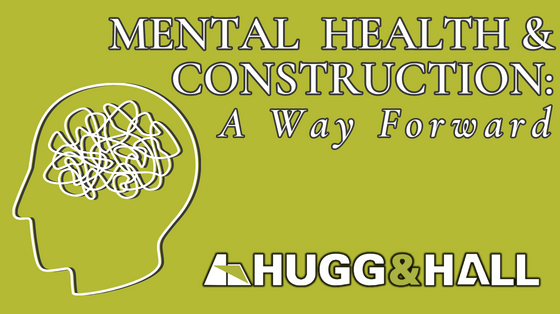
Mental Health and Construction: A Way Forward
Mental health should be a priority in all industries, but it’s even more important in industries like construction.
If you ask someone what the biggest dangers of working construction are, they’ll usually say physical injuries. But each year, more construction workers die from suicide than every construction workplace fatality combined.
In construction, workers often have an internalized sense of shame about mental health issues. But the stress of construction can cause anyone to feel depressed or anxious.
Mental health concerns in the construction industry require proactivity to ensure the well-being of your workers. Learn how to prioritize mental health and break the stigma for your team.
Construction employees are more vulnerable to burnout and mental health crises than many other fields. Construction workers face high-stress working conditions, physical strain on the body, and long, irregular hours in dangerous work environments.
Beyond on-the-job stressors, construction workers are facing job insecurity and financial stress. Despite construction workers’ tireless efforts to support their families during the pandemic, there has been little financial stability as a reward for surviving a difficult time.
Poor mental health has a negative effect on workers’ overall well-being and quality of life. Beyond the causes of burnout, construction workers face the repercussions of it.
Burnout can cause workers to feel drained, lose sleep, frequently get sick, or experience headaches and muscle pain. It can also cause your workers to feel helpless, trapped, defeated, or detached from the world.
Stress and burnout can lead to depression, anxiety, and other mental health conditions. An employee who is struggling with their mental health is more likely to be involved in an accident or be injured on the job. Employees who are suffering from sleep deprivation due to mental health issues are more likely to make mistakes and are often less productive.
Construction workers are also more likely to suffer from substance abuse than the average American. Since injury and illness rates are higher in construction than any other industry, many employees are prescribed painkillers and other prescription drugs when they are injured. More than 15% of construction workers suffered from substance abuse in 2018, and substance abuse nearly doubles the rate of suicide for men.
Employees experiencing burnout may have decreased productivity or may frequently be late. They may self-isolate or experience more conflicts with their coworkers.
If you see any of these signs present in your employees, respond immediately and offer access to professional health.
A lack of awareness and education about mental health issues affects employees before they even step onto the jobsite. Most construction workers do not express their feelings or seek help: of the 60% of construction workers struggling with their mental heath, only one-third said they would tell their employer.
The cultural stigma surrounding mental health is stronger in male-dominated spaces and careers. Men are often raised to be “tough” and not show any perceived weakness. A lack of mental health support from companies and managers discourages employees from asking for help.
Creating a supportive workplace environment begins with reducing the stigma around mental health. Normalizing discussions and providing the right resources for your employees will help you create a safe space for them.
Provide mental health benefits and resources.
Counseling services should be part of every employee’s benefits package. Encourage your employees to take part in these services. They may feel unwilling to see a counselor. Reminding your employees that these programs exist is a step in the right direction.
Offering mental health days, when employees can take time to rest physically and mentally, can actually improve productivity on your jobsite. Many workers are hesitant to take time off for mental health because they’re afraid of losing their jobs or being penalized. You can encourage team members to use these days when they’re experiencing stress or burnout.
Take preventative measures.
Even in a supportive workplace, you may have employees who aren’t willing to utilize mental health resources. You can still help these employees by managing their job-related stress.
One of the easier ways to prevent burnout is to encourage your team to take regular breaks, which are good for their mental and physical health. Communicating your expectations for employees can also help them feel more secure and less stressed.
Provide training about stress management.
Since long-term stress is one of the biggest causes of burnout, your team can benefit from a course about managing their stress. These courses can teach employees how to reduce stress in the moment, manage negative thoughts and feelings, motivate them, and more.
Training won’t eliminate stress in your employees’ lives, but it can give them healthy coping mechanisms to avoid burnout and depression.
Create a supportive work environment through open communication channels.
You can support your employees by creating a framework for how your team talks about mental health. Normalizing discussions about mental health can encourage employees to seek help when they are struggling. Speaking to your team with empathy and vulnerability can encourage them to speak up when they need help. You can create a culture of feedback and a sense of belonging on your team.
This news story details how construction company RK Mechanical made mental health a focus after losing an employee to suicide.
As an employer, you may notice employee push-back when mental health resources are made available in your company. Don’t despair, and don’t cancel the programs. Years of socialization to be “tough” can’t be dispelled overnight.
Construction workers are some of the hardest-working employees in our country, if not the hardest-working. Your team members deserve access to mental health resources to protect their lives.
Building a mental health program isn’t difficult, and it could even save someone’s life one day. In the construction industry and adjacent industries, we must all prioritize mental health and implement these proactive measures.
Back to News
Subscribe and unlock cutting-edge equipment insights, trends and tips!
Subscribe





